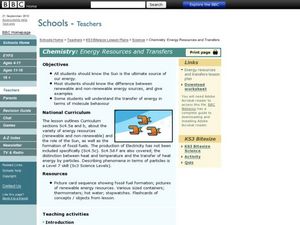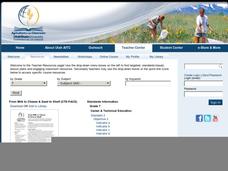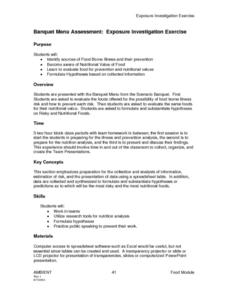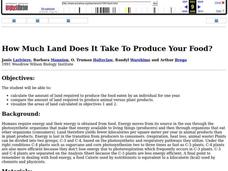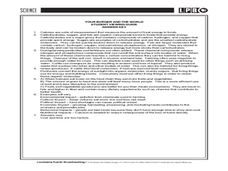Curated OER
Chemistry: Energy Resources and Transfers
Students explore the concepts of energy resources and energy transfers. In this chemistry instructional activity, students examine renewable and non-renewable energy sources as they view classroom demonstrations and discuss the concepts...
Curated OER
Food Webs
Learners investigate the concept of an ecosystem and how they are interconnected according to a hierarchy. Students are exposed to the "Lion King" as an example of a food chain and this is very relevant. They answer several key...
Curated OER
From Milk to Cheese & Seed to Shelf
Learn about food production by making cheese, seeing how a seed gets to a shelf, and discussing food safety. Budding agriculturalists complete several activities and learn about food production, biotechnology, food preservation,...
Curated OER
Sources of Energy
Students research various methods for preparing food and analyze energy sources. They explain that radiation, light, and heat are forms of energy used to cook food, treat diseases, and provide energy.
Curated OER
The Effects of Pesticides on the Food Chain
Fourth graders generalize that all animals, including people, depend on plants as a food source. In this science lesson plan, 4th graders describe and construct a food chain, tell how pesticides enter the food chain, and discuss possible...
Curated OER
The Science of Ghana
Students explore the climate and food sources of Ghana. In this lesson on climate students view diagrams of global convection and complete a convection experiment.
Curated OER
Figuring Out Food Labels
Students identify various sources of nutritional information and evaluate accuracy of messages. They comprehend and identify misrepresentations in current food labeling. Pupils evaluate specific consumer products for truth in labeling....
Curated OER
Biotechnology, GMOs and Food
Twelfth graders explore controversy around genetically modified foods, identify source of controversy, and role play town hall meeting on genetically modified foods, to examine viewpoints and arguments for and against genetic modification.
Curated OER
Ethical Ways to Acquire and Distribute Fish as a Food Source
Students complete a variety of activities as they examine the ethics of acquiring and distributing fish as a food source. They touch on the ethics involved in genetically modified salmon, as well.
Curated OER
Banquet Menu Assessment: Exposure Investigation Exercise
Learners identify sources of Food Borne illness and their prevention. They formulate hypotheses based on collected information. Pupils become aware of Nutrintional value of food. Students collected data are synthesized to formulate...
Curated OER
How Much Land Does It Take To Produce Your Food?
Students calculate the amount of land required to produce the food eaten by an individual for one year. They compare the amount of land required to produce animal versus plant products. Students visualize the areas of land calculated.
Curated OER
Photosynthesis: Using the Sun to Make Food
In this photosynthesis worksheet, students learn how plants use the sun to convert energy into food. They then answer 10 questions using the information they just read. The answers are on the last page.
Curated OER
Food Chain
Students explore the cycle of how each living thing gets food. In this food chain unit, students participate in four lesson plans that highlight animal vocabulary, habitats, and the role of humans in our ecosystem. Students demonstrate...
Curated OER
What is Energy?
Youngsters take a look at the foods they eat, and how they provide energy for them to do things. They look at how body uses the food energy to create movement. Pupils also look at toys/devices in the room that need electrical energy...
Curated OER
Food Safety-Consumers Need the Facts
Learners begin by completing a survey asking them to rank their concerns about commercially prepared foods. They develop a definition of relative risk, and complete the "Pro or Con" worksheet. Students work in groups to make a study of...
August House
Go to Sleep, Gecko
Use this multidisciplinary lesson to delve into these subjects: English language arts, math, science, drama, and character education. After reading, discussing, and making interpretations about Go To Sleep, Gecko!: A Balinese Folktale by...
Curated OER
Aquatic Science
What a terrific way to explore the pond habitat! Learners discuss the animal and plant life found in the Long Island area. They also discuss vocabulary terms, identify pollution concerns, and resource conservation.
Curated OER
An Introduction to Nutrition
Whether you need a new textbook for your health class, or a few exercises and passages for your lesson on nutrition, you'll find what you need with a thorough nutritional science resource. With 15 chapters that cover elements of...
US Environmental Protection Agency
Non-Point Source Pollution
Investigate the different types of pollution that storm drain runoff carries into oceans, lakes, rivers, and streams with this class demonstration. Using an aquarium and an assortment of everyday items that contaminants like motor oil,...
Biology Junction
Water Biomes
Water covers more than 70 percent of Earth's surface. Scholars learn about both freshwater and saltwater biomes in a simple presentation. They compare and contrast the differences in oxygen levels, food sources, and sunlight to better...
Curated OER
Dietary Guidelines/Food Pyramid Test
Students review Dietary Guidelines and the Food Guide Pyramid. They take a quiz listing recommended dietary guidelines and explain their function and implementation.
Curated OER
Fast Food: You Can Choose!
Learners research the nutritional value of fast food. They assess which fast foods are best and worst to eat. They organize their data into tables and graphs and explain their findings to other students.
Curated OER
Food Chain Pyramid
Second graders examine how a food chain functions. They define what a food chain is, and act out a food chain with the students acting as different animals. Students then sing the song "I Know An Old Lady Who Swallowed a Fly," and...
Curated OER
Food Makes the World Go Round
Fifth graders investigate the origins of foods they eat while they consider social justice issues. In this food sources lesson, 5th graders play a game and then research food distribution, food security, and hunger in the world today....


